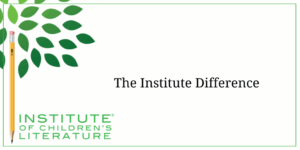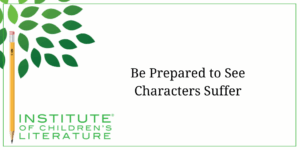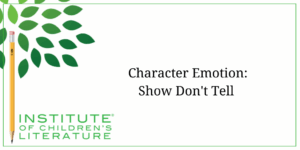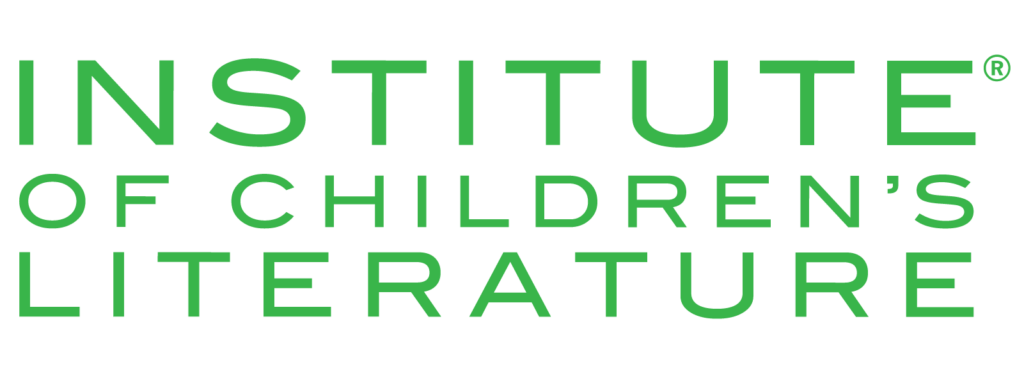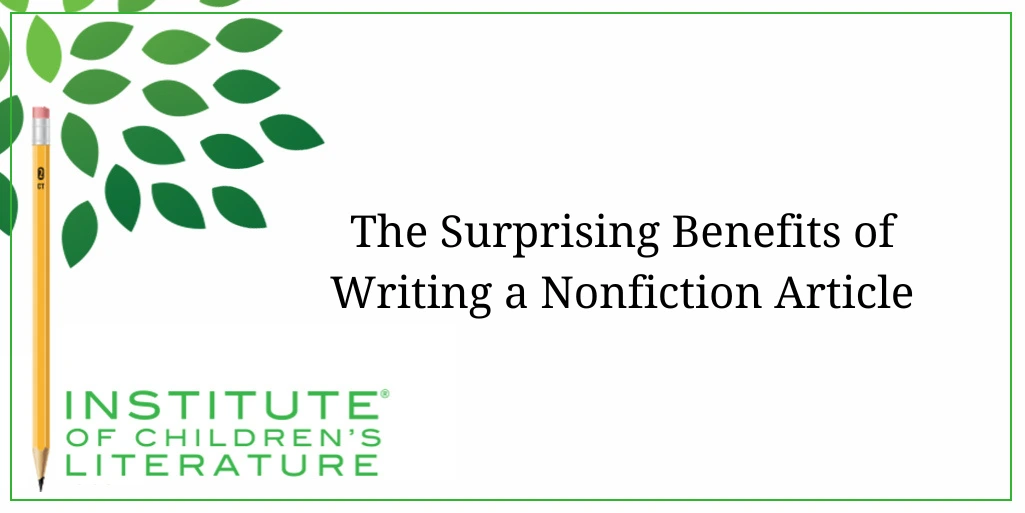
- Date: November 8, 2024
- Author: Jan Fields
- Category: Writing for Children Blog
- magazines, Market Guides, Nonfiction, Submissions
We teach our students how to write and get published!
View our Course Catalog >
The Surprising Benefits of Writing a Nonfiction Article
Most children's writers gravitate toward fiction. In fact, most people who think about writing anything for children are thinking about picture books with bright illustrations, rhyming text, and whimsical stories (usually involving talking animals), but there is a whole world of writing that is easier to break into and incredibly valuable to children: nonfiction articles.
 Writing a nonfiction article or essay isn't easy (neither is selling it), but it may be easier and quicker than writing and selling a picture book. There is slightly less competition, and the market is more open. That doesn't mean it doesn't require skill and work, but the fact that it is a more open market can make writing and selling essays and articles a huge morale booster during the dark days of rejection.
Writing a nonfiction article or essay isn't easy (neither is selling it), but it may be easier and quicker than writing and selling a picture book. There is slightly less competition, and the market is more open. That doesn't mean it doesn't require skill and work, but the fact that it is a more open market can make writing and selling essays and articles a huge morale booster during the dark days of rejection.
Nonfiction articles by writers with an interest in children's writing can appear in children's magazines, regional parenting magazines, newsletters, and blogs. They can be paying markets or unpaid. The value of unpaid writing is building your writing credits. The more you've been published in nonfiction, the easier it is to be published in nonfiction. Unpaid nonfiction can be a kind of “on the job” training for how to organize your nonfiction and how to write smoothly and clearly.
Writing a Nonfiction Article Begins with You
If you don't want to invest too much time in researching your nonfiction article, it can help to begin with something you know. If you are an expert in a field, that can be an excellent place to start writing a nonfiction article. Being an expert can involve a professional field like medicine, but it can also be a hobby in which you've invested time learning and building skills.
 Being an expert can be even simpler if you are writing something related to the life skills you've built by being a parent or being a functioning adult. Throughout our lives, we are stockpiling expertise, information, and mastery that can be the jumping-off point for an article or essay.
Being an expert can be even simpler if you are writing something related to the life skills you've built by being a parent or being a functioning adult. Throughout our lives, we are stockpiling expertise, information, and mastery that can be the jumping-off point for an article or essay.
For example, suppose you were particularly good at studying in college. You were an efficient note-taker. You were good at spotting important information in texts. You were a popular study partner because you could drill down on what was most likely to appear on tests. This is a skill many young people would like to have. If you can put into words the process of digging out the central ideas and important information, you'll be able to create a valuable article for students. Every student would like to get more benefit from less studying.
Brainstorming Nonfiction Articles
To come up with ideas for articles and essays, brainstorm! Sometimes you have skills that you haven't even considered. Try compiling a list of your accomplishments (big and small) and the things you are good at. Ask friends and family to suggest things. Think about the times people commented on something you can do as if it is impressive. Often, we don't realize the unique things we know. This is where friends and family can help.
 As mentioned, an accomplishment doesn't need to be something huge. Say you had a problem with deer in your flower bed. You didn't want to hurt the deer. You didn't want to put anything in the flower bed that might hurt pets. You didn't want to build a fence around the flowerbed that would obscure your view. So you began searching for ways to deal with the deer problem.
As mentioned, an accomplishment doesn't need to be something huge. Say you had a problem with deer in your flower bed. You didn't want to hurt the deer. You didn't want to put anything in the flower bed that might hurt pets. You didn't want to build a fence around the flowerbed that would obscure your view. So you began searching for ways to deal with the deer problem.
Eventually, you found something that worked for you. The process of overcoming a problem can turn into an article or essay. It can work even if you don't have a successful “happy ending.” Sometimes the deer wins, and if the ending is funny, you can sell it even so. Humor is a huge boon to writing an essay or article.
The benefit of beginning with what you know is that you can plan the piece and potentially even a rough draft before you invest much or any time in research. Keep in mind that this is an early step. No one gets out of a solid, publishable essay or article without a little research.
Research is for Everyone
Even if the core of your piece comes from your own knowledge and experience, you're still going to need research. Having supportive research helps prove that you know what you're talking about when writing a nonfiction article.
For example, suppose you've decided to write about how your ten-year-old struggled with organization and regularly missed homework deadlines. So, you came up with a system to help and things have been much better since. You figure it will help other parents. So, the core of the essay is going to be the story of what you did and how you did it.
Why would you need any research at all in that situation? Well, quite simply, it will sell better if you quote an expert or two in the finished piece. Or mention a research study. By adding small bits of research, you give the reader a reason to believe that what you're offering is going to help them in their own situation.
To Market, To Market
For me, I like to find a possible market before I write. This is because I don't want to write a 1200-word funny essay about discovering I had a family of mice in my walls, only to find the only market that is a good match wants 500-word essays. Cutting a piece in half while keeping the humor and excitement is tough. I really don't enjoy doing that. So I'll search for markets before I write.
 My market search usually begins right after my brainstorming step. I have all these potential essays or articles on my list of possibilities. Before I pick one to write, I find likely markets for them. I come up with keywords from the list.
My market search usually begins right after my brainstorming step. I have all these potential essays or articles on my list of possibilities. Before I pick one to write, I find likely markets for them. I come up with keywords from the list.
For example, say I decide to sell a recipe I came up with for a snack toddlers can help make. I'll do an online search for “submissions guidelines” “recipe” “toddlers” and see what comes up. If a possible match doesn't pop up, I'll change the search. I may try “writers' guidelines” instead of “submissions.” I may try “family” instead of “toddler.”
Another option for markets is to have good market guides, such as the ones put out by IFW and ICL. A good market guide will have an index at the back that will help to narrow the possible markets. I'll also look at online market lists, such as the ones on the Published to Death blog. One surprising benefit of market research is it often produces new ideas. I find reading submission guidelines and market guides to be inspirational, and I often come up with an article or essay idea during the process.
Once I have found a possible match, I follow the guidelines carefully. I make sure my piece is within the requested length. I make sure I format the submission exactly as asked. If they don't specify, I keep my format neat and easy to read. I watch carefully for any specific instructions such as the types of subject lines they want to see in email submissions. Attention to detail impresses editors.
And finally, I send the piece. And I start another. Because the more you write, the better you get, and the more you find submission success. So when you have a little time, consider spending it with an essay or article. You may just fall in love with this new writing form.
Related Articles on Writing a Nonfiction Article
With over 100 books in publication, Jan Fields writes both chapter books for children and mystery novels for adults. She’s also known for a variety of experiences teaching writing, from one session SCBWI events to lengthier Highlights Foundation workshops to these blog posts for the Institute of Children’s Literature. As a former ICL instructor, Jan enjoys equipping writers for success in whatever way she can.

